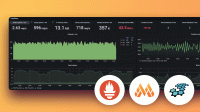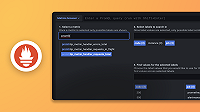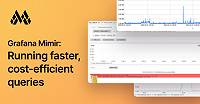This is documentation for the next version of Mimir. For the latest stable release, go to the latest version.
Grafana Mimir version 2.12 release notes
Grafana Labs is excited to announce version 2.12 of Grafana Mimir.
The highlights that follow include the top features, enhancements, and bug fixes in this release. For the complete list of changes, refer to the CHANGELOG.
Features and enhancements
Added support to only count series that are considered active through the Cardinality API endpoint
/api/v1/cardinality/label_namesby passing thecount_methodparameter. If set toactiveit counts only series that are considered active according to the-ingester.active-series-metrics-idle-timeoutflag setting rather than counting all in-memory series.The “Store-gateway: bucket tenant blocks” admin page contains a new column “No Compact”. If block no compaction marker is set, it specifies the reason and the date the marker is added.
The estimated number of compaction jobs based on the current bucket-index is now computed by the compactor. The result is tracked by the new
cortex_bucket_index_compaction_jobsmetric. If this computation fails, thecortex_bucket_index_compaction_jobs_errors_totalmetric is updated instead. The estimated number of compaction jobs is also shown in Top tenants, Tenants, and Compactor dashboards.Added
mimir-distrolesscontainer image built upon adistrolessimage (gcr.io/distroless/static-debian12). This improvement minimizes attack surfaces and potential CVEs by trimming down the dependencies within the image. After comprehensive testing, the Mimir maintainers plan to shift from the current image to the distroless version.
Additionally, the following previously experimental features are now considered stable:
The number of pre-allocated workers used to forward push requests to the ingesters, configurable via the
-distributor.reusable-ingester-push-workersCLI flag on distributors. It now defaults to2000. Note that this is a performance optimization, and not a limiting feature. If not enough workers available, new goroutines will be spawned.The number of gRPC server workers used to serve the requests, configurable via the
-server.grpc.num-workersCLI flag. It now defaults to100. Note that this is the number of pre-allocated long-lived workers, and not a limiting feature. If not enough workers are available, new goroutines will be spawned.The maximum number of concurrent index header loads across all tenants, configurable via the
-blocks-storage.bucket-store.index-header.lazy-loading-concurrencyCLI flag on store-gateways. It defaults to4.The maximum time to wait for the query-frontend to become ready before rejecting requests, configurable via the
-query-frontend.not-running-timeoutCLI flag on query-frontends. It now defaults to2s.The CLI flag that allows queriers to reduce pressure on ingesters by initially querying only the minimum set of ingesters required to reach quorum,
-querier.minimize-ingester-requests. It is now enabled by default.Spread-minimizing token-related CLI flags:
-ingester.ring.token-generation-strategy,-ingester.ring.spread-minimizing-zonesand-ingester.ring.spread-minimizing-join-ring-in-order. You can read more about this feature in our blog post.
Important changes
In Grafana Mimir 2.12 the following behavior has changed:
Store-gateway now persists a sparse version of the index-header to disk on construction and loads sparse index-headers from disk instead of the whole index-header. This improves the speed at which index headers are lazy-loaded from disk by up to 90%. The added disk usage is in the order of 1-2%.
Alertmanager deprecated the
v1API. Allv1API endpoints now respond with a JSON deprecation notice and a status code of410. All endpoints have av2equivalent. The list of endpoints is:<alertmanager-web.external-url>/api/v1/alerts<alertmanager-web.external-url>/api/v1/receivers<alertmanager-web.external-url>/api/v1/silence/{id}<alertmanager-web.external-url>/api/v1/silences<alertmanager-web.external-url>/api/v1/status
Exemplar’s label
traceIDhas been changed totrace_idto be consistent with the OpenTelemetry standard.Errors returned by ingesters now contain only gRPC status codes. Previously they contained both gRPC and HTTP status codes.
Warning
To guarantee backwards compatibility when migrating from a version prior to2.11, it’s necessary to first migrate to version2.11, and then to version2.12. Otherwise, it might happen that during the migration, some ingester errors with HTTP status code4xxwon’t be recognized, and the corresponding request will be repeated.Responses with gRPC status codes are now reported as
status_codelabels in thecortex_request_duration_secondsandcortex_ingester_client_request_duration_secondsmetrics.Responses with HTTP 4xx status codes are now treated as errors and used in
status_codelabel of request duration metric.
The default value of the following CLI flags have been changed:
-blocks-storage.tsdb.head-postings-for-matchers-cache-max-bytesfrom10MBto100MB.-blocks-storage.tsdb.block-postings-for-matchers-cache-max-bytesfrom10MBto100MB.-blocks-storage.bucket-store.tenant-sync-concurrencyfrom10to1.-query-frontend.max-cache-freshnessfrom1mto10m.-distributor.write-requests-buffer-pooling-enabledfromfalsetotrue.-locks-storage.bucket-store.block-sync-concurrencyfrom20to4.-memberlist.stream-timeoutfrom10sto2s.-server.report-grpc-codes-in-instrumentation-label-enabledfromfalsetotrue.
The following deprecated configuration options are removed in Grafana Mimir 2.12:
- The YAML setting
frontend.cache_unaligned_requests. - Experimental CLI flag
-querier.prefer-streaming-chunks-from-ingesters.
The following configuration options are deprecated and will be removed in Grafana Mimir 2.14:
The CLI flag
-ingester.limit-inflight-requests-using-grpc-method-limiter. It now defaults totrue.The CLI flag
-ingester.return-only-grpc-errors. It now defaults totrue.Warning
To guarantee backwards compatibility when migrating from a version prior to2.11, it’s necessary to first migrate to version2.11, and then to version2.12. Otherwise, it might happen that during the migration, some ingester errors with HTTP status code4xxwon’t be recognized, and the corresponding request will be repeated.The CLI flag
-ingester.client.report-grpc-codes-in-instrumentation-label-enabled. It now defaults totrue.The CLI flag
-distributor.limit-inflight-requests-using-grpc-method-limiter. It now defaults totrue.The CLI flag
-distributor.enable-otlp-metadata-storage. It now defaults totrue.The CLI flag
-querier.max-query-into-future.
The following metrics are removed or deprecated:
cortex_bucket_store_blocks_loaded_by_durationhas been removed.cortex_distributor_sample_delay_secondshas been deprecated and will be removed in Mimir 2.14.
Experimental features
Grafana Mimir 2.12 includes new features that are considered experimental and disabled by default. Use them with caution and report any issues you encounter:
The maximum number of tenant IDs that may be for a federated query can be configured via the
-tenant-federation.max-tenantsCLI flag on query-frontends. By default, it’s0, meaning that the limit is disabled.Sharding of active series queries can be enabled via the
-query-frontend.shard-active-series-queriesCLI flag on query-frontends.Timely head compaction can be enabled via the
-blocks-storage.tsdb.timely-head-compaction-enabledon ingesters. If enabled, the head compaction happens when the min block range can no longer be appended, without requiring 1.5x the chunk range worth of data in the head.Streaming of responses from querier to query-frontend can be enabled via the
-querier.response-streaming-enabledCLI flag on queriers. This is currently supported only for responses from the/api/v1/cardinality/active_seriesendpoint.The maximum response size for active series queries, in bytes, can be set via the
-querier.active-series-results-max-size-bytesCLI flag on queriers.Metric relabeling on a per-tenant basis can be forcefully disabled via the
-distributor.metric-relabeling-enabledCLI flag on rulers. Metrics relabeling is enabled by default.Query Queue Load Balancing by Query Component. Tenant query queues in the query-scheduler can now be split into subqueues by which query component is expected to be utilized to complete the query: ingesters, store-gateways, both, or uncategorized. Dequeuing queries for a given tenant will rotate through the query component subqueues via simple round-robin. In the event that the one of the query components (ingesters or store-gateways) experience a slowdown, queries only utilizing the other query component can continue to be serviced. This feature is recommended to be enabled. The following CLI flags must be set to true in order to be in effect:
-query-frontend.additional-query-queue-dimensions-enabledon the query-frontend.-query-scheduler.additional-query-queue-dimensions-enabledon the query-scheduler.
Owned series tracking in ingesters can be enabled via the
-ingester.track-ingester-owned-seriesCLI flag. When enabled, ingesters will track the number of in-memory series that still map to the ingester based on the ring state. These counts are more reactive to ring and shard changes than in-memory series, and can be used when enforcing tenant series limits by enabling the-ingester.use-ingester-owned-series-for-limitsCLI flag. This feature requires zone-aware replication to be enabled, and the replication factor to be equal to the number of zones.Support for UTF-8 in Alertmanager can be enabled via the
-alertmanager.utf8-strict-mode-enabledCLI flag. When enabled, Alertmanager can receive alerts with labels containing UTF-8 characters, and match these alerts in routes, inhibition rules, and silences. This feature has backwards-incompatible changes. Follow the instructions here to enable it.
Bug fixes
- Distributor: fixed an issue where
-distributor.metric-relabeling-enabledcould cause distributors to panic. - Distributor: fix an issue where
-distributor.metric-relabeling-enabledcould cause distributors to write unsorted labels and corrupt blocks. - Ingester: errors encountered while iterating through chunks or samples in response to a query request aren’t ignored anymore.
- Compactor: out-of-order blocks aren’t allowed to prevent timely compaction anymore.
- Querier: requests to store-gateway when a query gets canceled aren’t retried anymore.
- Querier: status code 499 is now returned instead of 500 when a request to remote read endpoint gets canceled.
- Querier: fixed an issue where
-querier.max-fetched-series-per-querywasn’t applied to/seriesendpoint in case series loaded from ingesters. - Querier: fixed an issue with the remote-read requests HTTP status code translations.
Previously, remote-read had conflicting behaviours: when returning samples all internal errors were translated to HTTP
400, while when returning chunks all internal errors were translated to HTTP500. With this fix, all validation errors will be translated into HTTP400errors, while all other errors will be translated into HTTP500errors. - Query-frontend: the
cortex_query_frontend_queries_totalmetric incorrectly reportedop="query"for any request which wasn’t a range query. Now theoplabel value can be one of the following:query: instant queryquery_range: range querycardinality: cardinality querylabel_names_and_values: label names / values queryactive_series: active series queryother: any other request
- Ruler: fixed an issue where “failed to remotely evaluate query expression, will retry” messages were logged without context such as the trace ID and didn’t appear in trace events.
- Ruler: requests to remote querier when server’s response exceeds its configured max payload size aren’t retried anymore.
- Ruler: fixed a regression that caused client errors to be tracked in
cortex_ruler_write_requests_failed_totalmetric. - Ruler: fixed an issue with recording rule result being corruption due to an usage of a bad native histogram pointer.
Helm chart improvements
The Grafana Mimir and Grafana Enterprise Metrics Helm charts are released independently. Refer to the Grafana Mimir Helm chart documentation.



